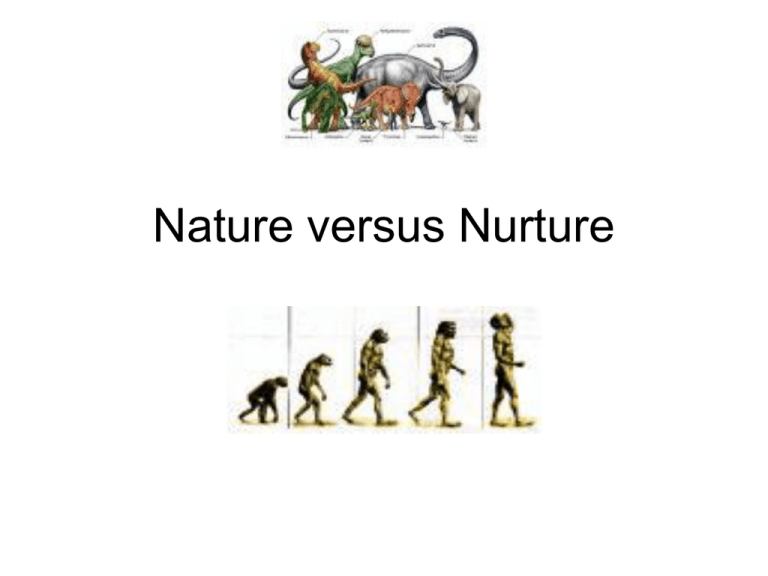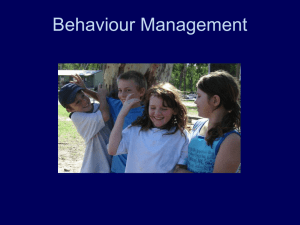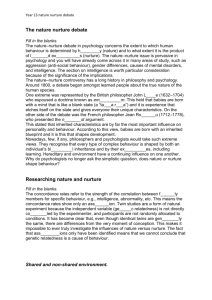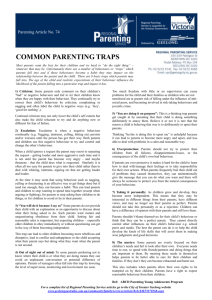PPT Nature V Nurture Debate
advertisement

Nature versus Nurture Nature • People behave the way they do because they are animals who act in accordance with their animal instincts and are determined by their biology. Nurture • People behave the way they do because they are determined by the things other people teach them, the things they observe around them, and because of the different situations they are put in. Activity Sheet AS5 • Complete the questionnaire on your own Activity Sheet AS5 • Complete the questionnaire on your own • Now discuss your responses and thoughts with your neighbours. Human Development Factors that affect the development of: • Behaviour • Personality • Language • Gender Roles Behaviour Anti-social Behaviour •Difficulty in getting on with others •Aggressive & disruptive •In children this includes hitting, bullying, teasing, verbal abuse. • hostile • non-cooperative Pro-social behaviour • Cooperation • Working together • Helping and caring behaviours • In children this includes sharing taking turns, responding to the needs of others Language Non verbal stage (babbling) Single word stage 2/3 word sentences Using grammar (adding ‘s’ for plural) More complex speech Ability to read and write Gender What differences are there between girls and boys behaviour? What stereotypes are there of Female/male behaviour & appearance? What makes boys and girls behave differently? Gender Differences • More risk taking • More aggressive • More physical • Rough & tumble play • Better mathematical Skills & spatial ability (map reading!) • Higher verbal ability • Higher spelling conversational ability. • Less Physical • ‘Caring’ less aggressive. Gender differences • • • • Clear Biological differences Occupational choice differs Playtime differs in children To what extent do media stereotypes affect the development of gender? • To what extent do parenting styles affect the development of gender? Personality • A unique set of characteristics • Relatively stable over time • What factors affect how our personality is shaped? What factors influence human Development? Theories of Human Development: • Piaget’s Theory of Cognitive Development • Learning Theory (Skinner) • Social Learning Theory (Bandura) • Bowlby’s Theory of Attachment • Freud’s Theory of Personality • Maslow’s Theory of motivation Factors that affect development 1. Genetics 2. Environment Genetics www.sciencemuseum.org.uk/exhibitions/genes/41.asp Genetics • Family traits, physical appearance, similarities, height, hair colour, eye colour Genotype •The genetic pattern an individual inherits. • Every human has 23 pairs of chromosomes, half inherited from the mother and half from the Father. These combine to form a UNIQUE gene pattern known as your GENOTYPE. P51 Reece Evidence to support Nature • Dr Thomas Bouchard of the Minnesota Centre for Twin Adoption Research concluded that genetic factors play a huge part in human behaviour. The study focussed on identical twins who had been raised apart from each other. • • http://www.youtube.com/watch?v=0yTCShemS_0&feature=player_embedd ed (2.30 mins) http://www.cbsnews.com/stories/2007/09/27/sunday/main3304885.shtml (paper article) • http://www.youtube.com/watch?v=1gwnzW4jOMI (10 mins) Genes alone do not predict development…. Mental illness & Environment Cognitive Development & Deprivation Obesity & Envirnoment Genetic patterned behaviour – behaviours we are born with. Genetic patterned behaviour….. Attachment in humans, Imprinting in animals – both behaviours promote survival MATURATION – a timetable of development built into a person’s genotype • Walking • Language • Puberty These are all UNIVERSAL and happen at roughly the same time. Variation in timings may be due to environmental influences e.g. nutrition. Environmental Factors • What environmental factors affect development? Environmental Factors • • • • • • • • Income Housing Nutrition Education Access to health facilities Parenting Styles Play Opportunities Weather Parenting Styles • http://ehlt.flinders.edu.au/education/DLiT/2002/family/par ent.htm Parental Influence • • • • Behaviour Attachment Gender roles Language COLD CHILD HAS LIITLE CHOICE UNAFFECTIONATE Authoritarian Style STRICT RULES FREQUENT PUNISHMENT Emotionally Warm Encourages Self-reliance Frequent guidance Punishes serious wrong-doings Explains rules Democratic Style Shares decision making Little guidance Does not apply rules or allows the child to do what he/she wants Emotionally warm PERMISSIVE STYLE Inconsistent Factors affecting Human Development Summary Access to Health Services Genetics Education Sense of ‘self’ Income Interaction with others Nutrition (pre & postnatal) Housing Parenting Styles Summary • Because someone is born into a low income environment, does NOT mean they will grow up to be poor & disadvantaged. • It is important to understand that a person’s sense of ‘SELF’ influences their development and the CHOICES they make gives them more CONTROL over their environment. • A person’s ability is strongly influenced by their GENOTYPE and the ENVIRONMENT. M1 Discuss the Nature/Nurture debate in relation to individual development. • We need to split into 2 groups to represent each side of the debate. • Before next week, prepare for your ‘camps’ debate. We will debate ‘In Context Chris and Ian on Pg 180 of your text book. Re-read PPT on Moodle, visit links given in PPT, read handout. Prepare some notes having read the case study. • Next week I will host a debate followed by drafting the assignment.











